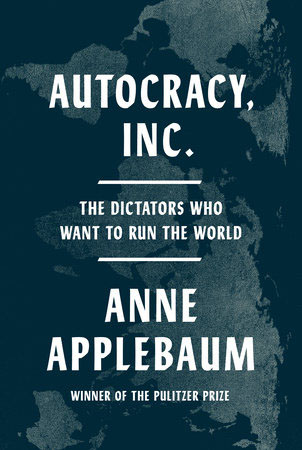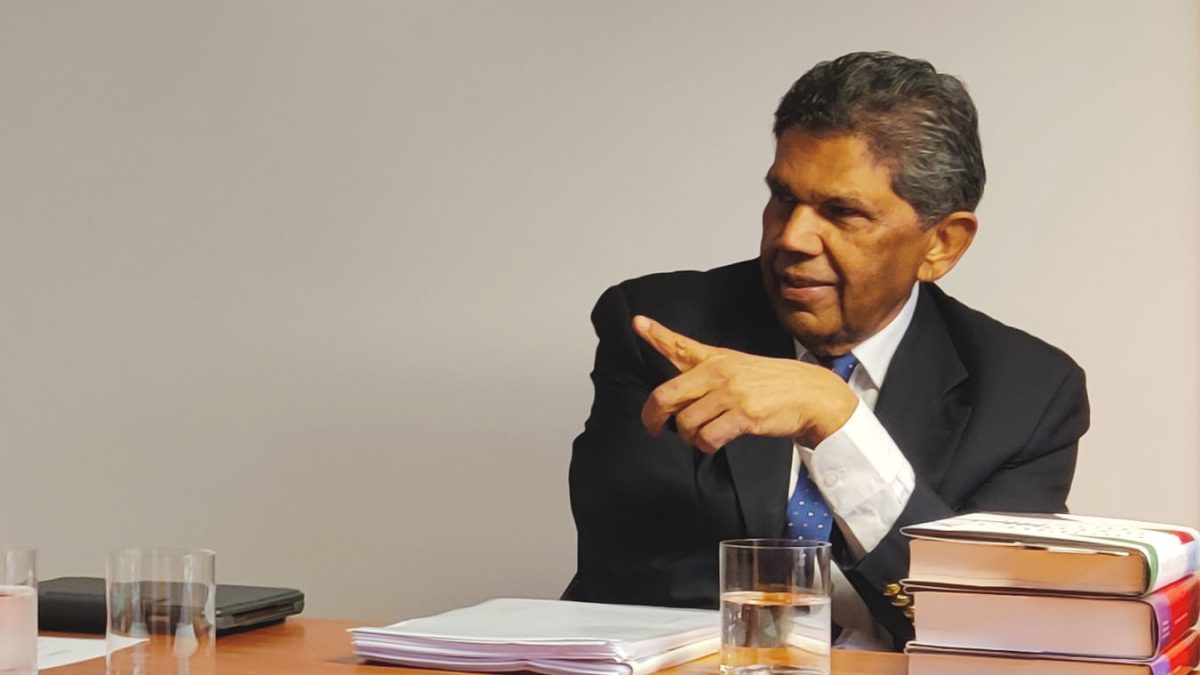`In Guyana, we have recently seen official inquisitions into the tax status of NGOs, calls for new laws to ‘regulate’ NGOs, and public campaigns of vilification against particular NGOs and their leaders. There are shades of autocracy here, without a doubt. And Guyana has also seen ‘highest level’ admonitions of judges carrying out their duties in good faith.’
Former Chancellor of the University of Guyana, Dr Bertrand Ramcharan has opined that Guyana is precariously poised between democracy and autocracy.
Ramcharan, in a column in today’s Stabroek News, underlined what he saw as autocratic tendencies in the current government and the predilection of the opposition PNCR towards the rigging of elections.
Both of these tendencies, he posited, have placed the country at a precipice with elections approaching next year.
Framing his argument in the backdrop of a recent book by Anne Applebaum entitled Autocracy Inc, Ramcharan cited the author’s declaration that “There is no liberal world order anymore, and the aspiration to create one no longer seems real. But there are liberal societies, open and free countries that offer a better chance for people to live useful lives than closed dictatorships do. They are hardly perfect. Those that exist have deep flaws, profound divisions, and terrible historical scars. But that’s all the more reason to defend and protect them.”
 The situation in Vene-zuela, he said, is one that Guyanese would do well to take note of. He said that Applebaum stated about the Maduro model of governance that autocrats who adopt it are “willing to see their country enter the category of failed states” and accepting economic collapse, endemic violence, mass poverty and international isolation if that’s what it takes to stay in power. Applebaum further wrote: “Iran, plus Russia, China, and Turkey have kept the profoundly unpopular Venezuelan regime afloat and even allowed it to support autocrats elsewhere.”
The situation in Vene-zuela, he said, is one that Guyanese would do well to take note of. He said that Applebaum stated about the Maduro model of governance that autocrats who adopt it are “willing to see their country enter the category of failed states” and accepting economic collapse, endemic violence, mass poverty and international isolation if that’s what it takes to stay in power. Applebaum further wrote: “Iran, plus Russia, China, and Turkey have kept the profoundly unpopular Venezuelan regime afloat and even allowed it to support autocrats elsewhere.”
“Why mention Maduro’s Venezuela here? Because, in the context of the on-going electoral imbroglio, with the Presidents of Brazil and the USA calling for new elections in Venezuela, it should come as no surprise to anyone if the `Maduro model’ were to resort to active aggression against Guyana’s Essequibo – with support from Autocracy Inc”, Ramcharan wrote.
Returning to the question posed in the title of essay: `Whither Guyana: Autocracy or Demo-cracy?’, Ramcharan, a former Acting UN High Commissioner for Human Rights, said that some historical context was necessary.
“Prior to attaining its independence, Guyana was a violent theatre of the Cold War. Dr Cheddi Jagan was branded a communist and he and the PPP were shunted from power. Forbes Burnham, then wearing the cloak of a democrat, took Guyana into independence and proceeded to do the following things: rig elections blatantly and massively; replace the Independence Constitution through a fraudulent referendum; declare the PNC a Marxist Leninist party – the ‘vanguard party’; place the party above the Government; and exercise dictatorial powers as an all-powerful Executive President. These are all established historical facts.
“Burnham’s successor, Desmond Hoyte also rigged elections but then, under international pressure following the end of the Cold War in 1989, accepted free and fair elections in 1992. Between 1992 and 2020 there have been various shades of instability around each election held. There has been one distinguishing feature of this instability: the PNC has not been willing to accept the result of most of these elections, with resultant disorder and violence. It did come to power fairly with a slender majority in 2015 but the evidence is overwhelming that it illegally sought to remain in power even though it had lost the elections in 2020:, he declared.
As elections approach in 2025, leading PNCR advocates – and others of goodwill – are calling for a changed system of governance and for inclusive governance, or for power-sharing. Those now in government have, so far, side-stepped such calls and, although a Parliamentary commission has been established to look at constitutional changes, it remains to be seen whether any such change will come about in the year or so before elections are due, he said.
It is in this context, Ramcharan added, that the question arises for reflection as to Guyana’s future path from the perspectives of autocracy or democracy.
“Two historical facts stand out: first, the PNCR has a record of subverting elections; and, second, the PPP has a record of autocratic tendencies”, he said.
Defending his position, he said that in 2009, Applebaum wrote that Uganda passed a law giving a government board the power to regulate and even dissolve domestic civic organizations. An Ethiopian version of the same law, she said, gave a similar board the right to abolish organizations if they are deemed “prejudicial to public peace, welfare, or good order in Ethiopia”, language sufficiently vague to allow the abolition of almost any organization. She also pointed out that Cambodia passed a law banning any organizations whose activities “jeopardize peace, stability, and public order or harm the national security, national unity, culture and traditions of Cambodian society,” which pretty much covers any activity the government wants to ban.
In January 2024, Ramcharan pointed out that Venezuela’s National Assembly took up a new law that would allow the government to dissolve NGOs and impose heavy fines on their members for breaking any of a long list of arbitrary requirements. Cuba, which, according to Applebaum, has not registered any independent organizations since 1985, has recently arrested hundreds of people who participated in informal groups too.
“In Guyana, we have recently seen official inquisitions into the tax status of NGOs, calls for new laws to ‘regulate’ NGOs, and public campaigns of vilification against particular NGOs and their leaders. There are shades of autocracy here, without a doubt. And Guyana has also seen ‘highest level’ admonitions of judges carrying out their duties in good faith”, he posited.
While Ramcharan did not mention it, the Guyana Government is working on legislation aimed at registering non-governmental organisations (NGO).
The move will likely raise concerns in light of recent attacks by senior government officials on NGOs in what has been seen as an attempt to limit the space available to them. There are also concerns that their access to funding could come under threat.
“First of all, there is legislation that registers NGOs. The Friendly Society Act, [and] some register under Companies Act, others as a Trust. However, most of them are in breach, with regard to annual audited reports required etcetera,” Minister of Parliamentary Affairs Gail Teixeira had told the Sunday Stabroek when contacted in May this year on the legislation.
“I am working on a new draft law regarding registering NGOs. And when ready, [there will be] consultations with NGOs and subsequent movement to parliament,” she added. The draft law has not yet been published.
“There are also other shades of autocracy: Parliamentary scrutiny of governmental activity is minimal, if existent. Governmental consultation with the opposition is hardly existent. Oil money has made the Government lush with funds for information campaigns. And an Oracle in the ruling party pronounces on all matters, big and small. The spirit of governance smells of autocracy”, Ramcharan declared.
His allusion to an Oracle will be seen as a reference to Vice President Bharrat Jagdeo.
Guyana’s historical record, he said, is thus a blemished one when it comes to assessing it from the perspectives of autocracy and democracy: one party has subverted elections, while the other party practices “All is mine.”
There can be no doubt, he said, that the Guyanese people, across the board, are a freedom-loving people, in favour of democracy, the rule of law, and respect for fundamental human rights. This is a part of their DNA, he added.
“In the coming global struggle then, between Autocracy Inc. and Democracy Inc., Guyana belongs squarely within the sphere of Democracy Inc. It would help us to navigate our way inside Democracy Inc. if we could negotiate a new system of governance that would give every Guyanese a sense of belonging, or ownership, of their system of Governance.
“So far, no leader of any of the political parties has been able to rise to this challenge of leading us to a system of governance in which every Guyanese would feel that she or he has a stake. And none of the leading parties has thus far risen to this challenge.
“Until Guyana succeeds in devising a trusted system of governance, it will remain precariously poised between democracy and autocracy, with vibes of autocracy manifesting themselves in the governance of the country.
And the Oracle, whatever it says, will remain an irrelevance in the judgment of history”, he declared.






